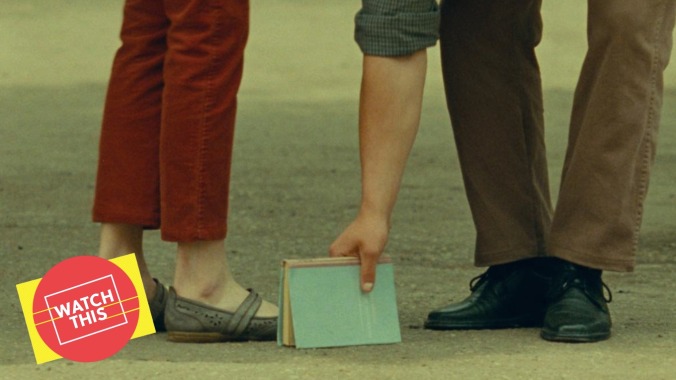What Do We See When We Look At The Sky? is one of the most entrancing, inventive films of the year
Alexandre Koberidze's romance is suffused with the magic of the everyday
Film Lists What Do We See When We Look at the Sky?
Watch This offers movie recommendations inspired by new releases, premieres, current events, or occasionally just our inscrutable whims. This week: One more time, we’re accounting for our sins of omission and looking back on the best movies of 2021 we didn’t review.
What Do We See When We Look At The Sky? (2021)
On paper, the opening minutes of What Do We See When We Look At The Sky? might sound like the start of a standard romantic comedy. In the Georgian city of Kutaisi, two strangers, Lisa (Oliko Barbakadze) and Giorgi (Giorgi Ambroladze), meet-cute twice in a single day, and then make plans to rendezvous the following evening. Already, though, writer-director Alexandre Koberidze sets his film apart, withholding the actors’ faces during both meetings: He presents the first in a shot tightly framed from the knees down, and the second in an extreme wide, so the two are all but indistinguishable against the nighttime cityscape. Soon after, a narrator (voice of Koberidze) informs us that a supernatural force has bewitched the pair to keep them apart. The next morning, Lisa and Giorgi are transformed into different-looking people (now played by Ani Karseladze and Giorgi Bochorishvili, respectively). They are unable to keep their intended date.
Thus begins one of the most singular, inventive films of the year. Recalling a folktale or fairy tale, What Do We See is concerned less with plausibility than with inviting a sense of childlike participation in the story. (It’s no coincidence that the durable conventions of romantic comedy are so often said to descend from such stories.) Across a languid 150 minutes, the film watches the two would-be lovers unwittingly circle each other, keeping closer than they think. Each is convinced that something has happened to the other, preventing them from making the meeting, but each is equally convinced that they will meet again eventually. We are invited to share in this conviction.
What Do We See maintains a warm, playful tone throughout—which makes it easy to guess that Lisa and Giorgi will get together somehow. But in the meantime, everything that would ordinarily be just background for a blooming romance takes center stage. We learn of a pair of filmmakers trying to finish their latest project; of a café owner’s attempts to generate business during a highly anticipated World Cup match; and even of two stray dog friends, each with their preferred locations in Kutaisi for watching soccer. From the moment that the pair is cursed, the entire city feels touched by magic, as if anything could happen—so long as Koberidze can think it up, anyway.
Instead of back-and-forth dialogue (as in a more conventional drama), we mostly hear Koberidze narrating over quietly observational scenes, which makes the film feel something like “silent” sound cinema, to use an intentionally contradictory phrase. Often, What Do We See digresses from Lisa and Giorgi to observe this or that peripheral detail—a group of friends singing a capella through the evening, a bunch of kids cutting class—enraptured by the magic of the everyday. As the film goes on, it seems bound together not so much by the details of the story, as by the narrator’s pleasure in telling it. This is also to say that What Do We See is suffused by Koberidze’s unabashedly romantic sensibility. His imaginative flights of fancy are perfectly complemented by his brother Giorgi’s lush, varied score and cinematographer Faraz Fesharaki’s luminous, golden imagery (a mix of 16mm and digital).
Perhaps the clearest indication of the director’s personality, however, is the moment just before Lisa’s initial transformation. Over a shot of Barbakadze’s Lisa sleeping in bed, onscreen text instructs us to close, and then reopen, our eyes at a designated sound signal. It’s like the beginning of a magic trick—an invitation to enter a world of possibility, so long as we are willing to take that first step. And it’s a pretty good litmus test for potential viewers, too. Not everyone will want to close their eyes for those precious few seconds, but for those who are willing, What Do We See offers one of the giddiest, most exciting experiences of the year. Transformation is possible, Koberidze seems to say, if only we would reopen our eyes.
Availability: What Do We See When We Look At The Sky? is in select theaters now. It begins streaming on MUBI January 7.